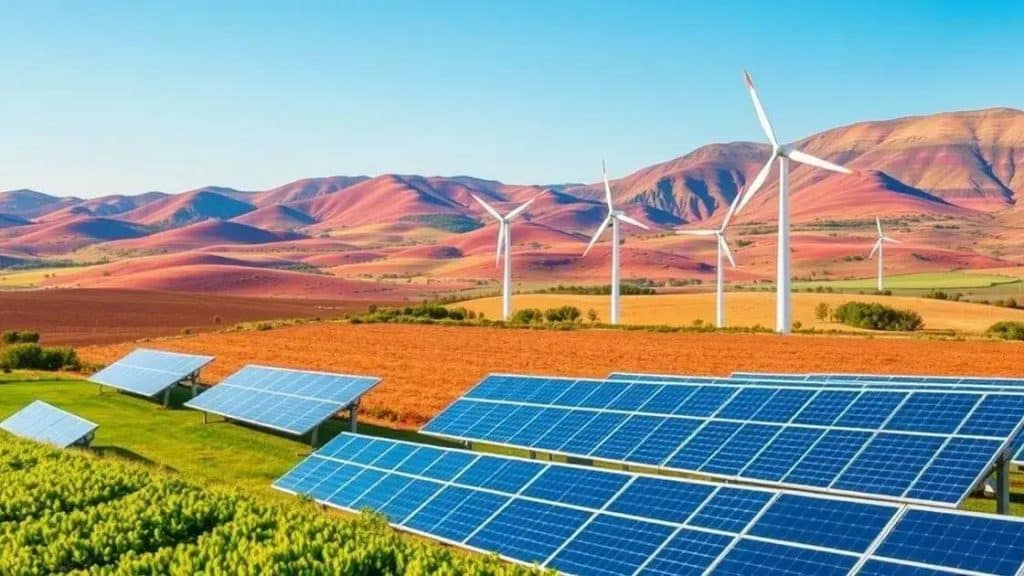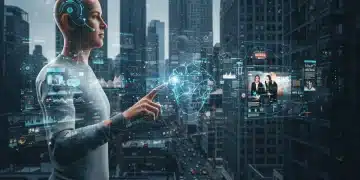Sustainable technology outlook: innovations shaping the future

Sustainable technology refers to innovative solutions that reduce environmental impact while enhancing efficiency across various industries, driving economic benefits and fostering a greener future.
The sustainable technology outlook presents an exciting view of how innovations are paving the way for a greener future. Have you thought about the impact these technologies could have on our daily lives? Let’s dive into what’s happening in this transformative space.
Understanding sustainable technology
Understanding sustainable technology involves recognizing how innovations can solve environmental issues. It’s not just about cutting down carbon footprints; it’s a way to redefine our interaction with the planet. By embracing new methods and materials, we prepare for better living conditions for future generations.
Key Concepts of Sustainable Technology
There are several key concepts that drive sustainable technology. These principles ensure that the advancements we make genuinely work towards environmental preservation.
- Energy efficiency: Utilizing less energy for the same service.
- Renewable resources: Harnessing energy from sources that are naturally replenished.
- Waste reduction: Creating processes that minimize waste generation.
- Social equity: Ensuring that technology benefits all segments of society fairly.
Moreover, technology is rapidly evolving. For instance, developments in solar and wind energy are changing how we think about power generation. These solutions are sustainable because they reduce our reliance on fossil fuels, which have significant environmental impacts.
Examples of Sustainable Technology
Everywhere you look, sustainable technologies are making waves. From electric vehicles to smart grids, their influence is vast.
Electric vehicles are one example that showcases how sustainability integrates with daily life. These cars reduce emissions and are becoming more popular due to advances in battery technology.
Smart grids also represent a leap forward. They manage electricity use more efficiently, ensuring that energy is available when needed, minimizing waste. This technology allows energy systems to respond dynamically to varying demands and supply constraints, acting as a crucial component in sustainable energy transition.
Implementing sustainable practices is encouraging innovation across many industries. For businesses, embracing these changes can lead to new opportunities and savings. As more companies adopt green technologies, the momentum towards a sustainable future grows stronger.
In summary, understanding sustainable technology means recognizing the importance of innovations that respect and support our environment. These advancements don’t just benefit our planet; they also enhance our lives by improving efficiency and reducing costs.
Current innovations in sustainable tech

Current innovations in sustainable tech are opening new avenues for environmental preservation and efficiency. Many industries are adopting cutting-edge technologies to minimize their ecological footprint. These advancements are crucial for creating a better world for future generations.
Notable Innovations
Innovations in sustainable technology include advancements in various fields. From energy production to waste management, these technologies are transforming the way we live.
- Solar energy advancements: New materials are increasing efficiency.
- Biodegradable plastics: Reducing pollution through innovative materials.
- Smart irrigation: Using technology to conserve water in agriculture.
- Carbon capture: Technologies that capture and store carbon emissions.
Each of these innovations plays a vital role in addressing climate change. For example, advancements in solar energy have made it more accessible and cost-effective. With better solar panels, homeowners can generate their own clean energy while reducing dependency on fossil fuels.
The Role of AI in Sustainability
Artificial Intelligence (AI) is also a game changer in sustainable technology. AI helps businesses optimize their operations and reduce waste. It can analyze patterns and suggest improvements that enhance efficiency.
In agriculture, AI can predict crop yields and recommend resource usage, leading to better farming practices. This integration promotes sustainability while ensuring food security for a growing population. Furthermore, AI applications in urban planning can lead to smarter, more sustainable cities.
Across industries, current innovations are proving that technology does not have to harm the environment. Instead, it can pave the way for a sustainable future. Embracing these changes can lead to new economic opportunities while protecting our planet.
Impact of sustainable technology on industries
The impact of sustainable technology on industries is profound and far-reaching. It reshapes how businesses operate while promoting environmental responsibility. Many companies are finding that adopting sustainable practices not only helps the planet but also improves their bottom line.
Transformations in Key Sectors
Various sectors are experiencing significant transformations due to sustainable technology. From manufacturing to agriculture, these changes help industries reduce waste and enhance efficiency.
- Manufacturing: Implementing eco-friendly processes reduces pollution and energy consumption.
- Construction: Using sustainable materials can minimize environmental impact and improve efficiency.
- Agriculture: Smart farming technologies increase yield while conserving resources.
- Transportation: Electric vehicles and optimized logistics reduce carbon footprints.
In the manufacturing sector, companies are increasingly focusing on green processes. By adopting renewable energy sources and reducing waste, manufacturers can lower costs and meet consumer demand for more sustainable products.
Economic Benefits
The economic benefits of sustainable technology are becoming evident. Many industries are seeing significant cost savings from efficiency improvements. For example, companies that invest in renewable energy often reduce their electricity bills over time.
Moreover, sustainability attracts consumers who are willing to pay a premium for eco-friendly products. As public awareness grows, firms that prioritize sustainable practices can differentiate themselves in competitive markets.
The shift towards sustainability also encourages innovation. Companies are continually developing new solutions to reduce their environmental impact. This drive for improvement can lead to new products and services that fulfill unmet needs in the marketplace.
Ultimately, the impact of sustainable technology extends beyond individual businesses. As more companies implement these practices, entire industries adopt more responsible operations, contributing to a healthier planet for everyone.
Future trends in sustainable technology

The future trends in sustainable technology indicate an exciting shift towards a greener world. As technology evolves, we are witnessing developments that can address the pressing environmental challenges we face today. Understanding these trends is essential for businesses and individuals looking to make a positive impact.
Emerging Technologies
New technologies are on the rise that promise to enhance sustainability across various sectors. One notable area is energy storage. Advanced batteries are being developed to store renewable energy more efficiently. This allows for a more reliable power supply and increases the feasibility of solar and wind energy.
- Smart cities: Integrating technology to improve urban living.
- Decentralized energy: Local energy solutions reducing reliance on centralized sources.
- Sustainable agriculture: Innovations improving food production and reducing waste.
- Water purification: Advanced methods for providing clean water.
In addition to energy storage, the growth of smart cities is becoming a significant trend. By using sensors and data analytics, cities can optimize traffic flow and reduce pollution. This leads to better resource management, enhancing the quality of life for residents.
Artificial Intelligence and Sustainability
Artificial Intelligence (AI) is expected to play a crucial role in driving future sustainable practices. AI technologies can analyze vast amounts of data to find optimal solutions for reducing waste and improving efficiency.
For instance, AI can assist in managing energy consumption in buildings. By predicting usage patterns, AI can adjust heating and cooling systems, lowering energy costs and emissions. Additionally, businesses can leverage AI to optimize supply chains, reducing their environmental impact.
As industries continue to adopt sustainable technologies, collaboration will be key. Partnerships among companies, governments, and organizations can foster innovation and speed up the transition to more sustainable practices. The more we work together, the closer we get to achieving a sustainable future.
In summary, the shift towards sustainable technology is essential for a greener future. Every industry can benefit from new innovations that reduce environmental impacts and improve efficiency. By embracing these trends, we can protect our planet while enhancing our quality of life. Working together, we can create a sustainable future for generations to come.
\n\n
\n
FAQ – Frequently Asked Questions about Sustainable Technology
What is sustainable technology?
Sustainable technology refers to innovative solutions that aim to reduce environmental impact while improving efficiency and productivity across various industries.
How does sustainable technology affect businesses?
By adopting sustainable technology, businesses can lower costs, attract eco-conscious consumers, and enhance their brand image, leading to increased competitiveness.
What are some examples of sustainable technology?
Examples include renewable energy systems like solar and wind, smart city infrastructure, electric vehicles, and biodegradable materials.
How can AI contribute to sustainable practices?
AI can optimize resource use, improve supply chain efficiency, and enhance data analytics, leading to reduced waste and a smaller carbon footprint in operations.





